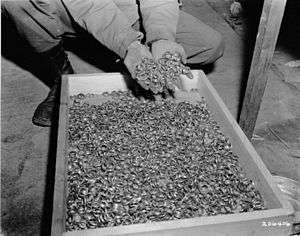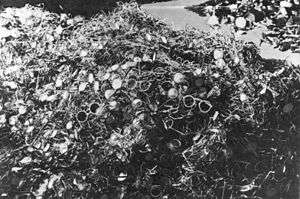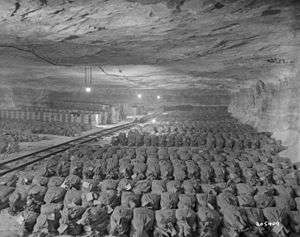Walther Funk
| Walther Funk | |
|---|---|
 Funk with Golden Party Badge, 1942 | |
| Reich Minister of Economics Nazi Germany | |
|
In office 5 February 1938 – 1 May 1945 | |
| President |
Adolf Hitler Führer |
| Chancellor | Adolf Hitler |
| Preceded by | Hermann Göring |
| Succeeded by | Office abolished |
| President of the Reichsbank | |
|
In office 19 January 1939 – 8 May 1945 | |
| Preceded by | Hjalmar Schacht |
| Succeeded by | Office abolished |
| Secretary of State in the Ministry of Public Enlightenment and Propaganda | |
|
In office 13 March 1933 – 26 November 1937 | |
| Appointed by | Adolf Hitler |
| Preceded by | Office created |
| Succeeded by | Otto Dietrich |
| Personal details | |
| Born |
18 August 1890 Danzkehmen, Kingdom of Prussia, German Empire |
| Died |
31 May 1960 (aged 69) Düsseldorf, West Germany |
| Political party | National Socialist German Workers Party |
| Spouse(s) | Luise Schmidt-Sieben |
| Profession | Journalist |
| Religion | Protestantism |
Walther Funk (18 August 1890 – 31 May 1960) was an economist and prominent Nazi official who served as Reich Minister for Economic Affairs from 1938 to 1945 and was tried and convicted as a major war criminal by the International Military Tribunal at Nuremberg.
Early life
Funk was born into a merchant family in 1890 in Danzkehmen (present-day Sosnowka in the Russian Kaliningrad Oblast) near Trakehnen in East Prussia. He was the only one of the Nuremberg defendants who was born in the former eastern territories of Germany. He was the son of Wiesenbaumeister Walther Funk the elder and his wife Sophie (née Urbschat). He studied law, economics, and philosophy at the Humboldt University of Berlin and the University of Leipzig. In World War I, he joined the infantry, but was discharged as unfit for service in 1916. In 1920, Funk married Luise Schmidt-Sieben. Following the end of the first war, he worked as a journalist, and in 1924 he became the editor of the centre-right financial newspaper the Berliner Börsenzeitung.
Political life



Funk, who was a nationalist and anti-Marxist, resigned from the newspaper in the summer of 1931 and joined the Nazi Party, becoming close to Gregor Strasser, who arranged his first meeting with Adolf Hitler. Partially because of his interest in economic policy, he was elected a Reichstag deputy in July 1932, and within the party, he was made chairman of the Committee on Economic Policy in December 1932, a post that he did not hold for long. After the Nazi Party came to power, he stepped down from his Reichstag position and was made Chief Press Officer of the Third Reich.
Third Reich career
In March 1933, Funk was appointed as a State Secretary (Staatssekretär) at the Ministry of Public Enlightenment and Propaganda (Reichsministerium für Volksaufklärung und Propaganda). In 1938, he assumed the title of Chief Plenipotentiary for Economics (Wirtschaftsbeauftragter). He also became Reich Minister of Economics (Reichswirtschaftsminister) in February 1938, replacing Hjalmar Schacht, who had been dropped in November 1937. Schacht had been dismissed in a power struggle with Reichsmarschall Hermann Göring, who was quick to tie the ministry more closely to his Four Year Plan Office.
Confiscation of Jewish property
At Nuremberg, Funk was accused by Allied prosecutors of having been closely involved in the State confiscation and disposal of the property of German Jews from this time. He boasted that by 1938, the German state had confiscated Jewish property worth two million marks, using decrees from Hitler and other top Nazis to force German Jews to leave their property and assets to the State if they emigrated. They were forced by Göring to pay for the damage caused by the Nazis to their own property on Kristallnacht, and increasingly deprived of their personal wealth and assets as the Second World War approached.
Reichsbank
In the year April 1938-March 1939 Funk was a Director of the Swiss-based multi-national Bank of International Settlements,[1] and in January 1939, Hitler appointed Funk as President of the Reichsbank, replacing Schacht. He was appointed to the Central Planning Board in September 1943.
Nuremberg
Despite poor health, Funk was tried with other Nazi leaders at the Nuremberg trials. Accused of conspiracy to commit crimes against peace; planning, initiating and waging wars of aggression; war crimes and crimes against humanity, he argued that, despite his titles, he had very little power in the regime. At the Nuremberg trials American Chief Prosecutor Jackson labeled Funk as "The Banker of Gold Teeth", referring to the practice of extracting gold teeth from Nazi concentration camp victims, and forwarding the teeth to the Reichsbank for melting down to yield bullion. Many other gold items were stolen from victims, such as jewellery, eyeglasses and gold finger rings.[2] Göring described Funk as "an insignificant subordinate," but documentary evidence and his wartime biography Walther Funk, A Life for Economy were used against him during the trial, leading to his conviction on counts 2, 3 and 4 of the indictment and his sentence of life imprisonment.
Funk was held at Spandau Prison along with other senior Nazis. He was released on 16 May 1957 because of ill health. He made a last-minute call on Rudolf Hess, Albert Speer and Baldur von Schirach before leaving the prison.[3] He died three years later in Düsseldorf of diabetes.
References
- ↑ Bank of International Settlements, "Ninth Annual Report: 1 April 1938 – 31 March 1939" p. 135-7
- ↑ Nuremberg: Tyranny on Trial. History Channel. 1995. Television
- ↑ Bird, Eugene (1974). The Loneliest Man in the World. London: Secker & Warburg. p. 121. ISBN 0436042908.
External links
| Wikiquote has quotations related to: Walther Funk |
